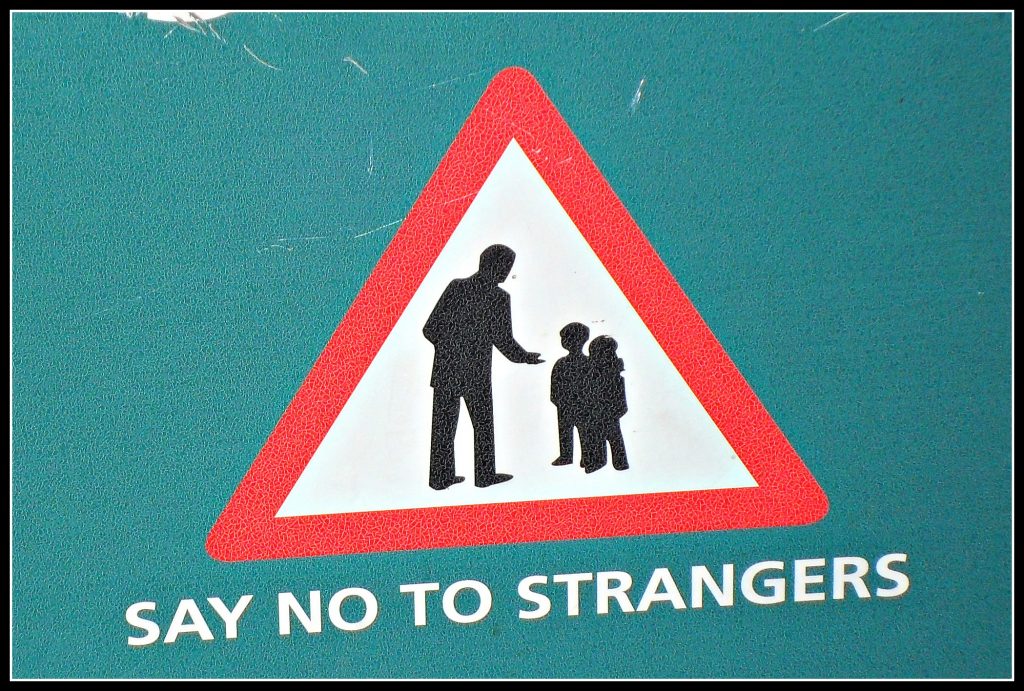Do us parents, grandparents and adults send out conflicting messages about stranger danger? I think some of us behave in a very questionable and confusing way.

Just the other day I wrote this blog post about the school run of my childhood. In doing so, I confessed that on one occasion I willingly accepted a lift from a stranger as I walked home along an isolated country road.
It was a slightly awkward situation as this guy knew my uncle. As a result, he knew who I was, but I had no idea of his identity. Regardless, I willingly got into his van and he drove me home, the journey passing without incident, other than me having a small panic when I realised I’d broken all the rules and accepted a lift from someone I didn’t know.
In response to that post, the rather brilliant Simon Ragoonanan, who writes the ManVsPink blog, left a comment. It turns out he had done exactly the same thing on the way home from school. Just like me, he was dropped off at home untouched.
Thing is, should adults behave in this way? I would argue the individuals that took Simon and I home were acting inappropriately. To an adult this behavior may seem like an act of kindness and generosity. The flip side of this argument is that they’re undoing all the work parents have done hammering home the stranger danger message.
It may seem like a harsh reaction, but I always feel uncomfortable when someone sparks up a conversation with my kids in public. We’ve all been there. It’s very often an older person who says hello to your kid and tells them how pretty they look etc.
They clearly mean no harm and have the best intentions. Only thing is, approaching a child in this way, even if they are with a parent or guardian, sends out the message that it is okay to talk to strike up a conversation with an unknown adult.
Personally, I’m always very guarded when I speak to children I don’t know. There are limits. If a child takes a tumble in front of me I’ll help them up and check they are okay. If a child is lost, I’ll help. If, however, a child tries chatting to me in public, I usually do my best to ignore them. It’s not that I’m trying to be rude, I simply don’t want to encourage them to speak to people they don’t know.
Tell me, is my approach wrong? Should I be more willing to speak to children in public? Does it bother you when strangers talk to your children in public? Please do leave a comment below outlining your thoughts.
Pic credit: Chris UK. Image reproduced under Creative Commons agreement.







8 thoughts on “Do you send out conflicting messages about stranger danger?”
I agree that we should teach our children to NOT accept lifts from strangers, or accept offers to be led away. But for me, a hardline ‘stranger danger’ approach has problems. First, we know most child abuse is actually from people known to the child so I don’t know how effective it is at keeping our children safe. But a more likely scenario is her getting lost. Who would she turn to for help if she is taught to never to talk to strangers? I simply don’t want her to assume strangers are a danger. I also worry we’re raising a generation of children, especially girls, to be afraid of men in particular.
If a child starts chatting to me in public, I always engage with them. I have no issue with an adult starting up a conversation with my daughter, and I encourage her to be polite and respond.
A dose of common sense needs to be applied here. I would like to think my kids would seek out help if they got lost and needed assistance. I also totally understand that roads pose a considerably greater threat to kids than unknown adults (be they men or women).
Having taught my kids not to engage with randoms, however, I don’t appreciate it when someone comes up to them and starts chatting to them in public. It contradicts what they have been taught and is confusing for them.
This is such a tough one – I have a young nephew who’s always very friendly and talkative to strangers. He’ll start conversations with anyone and adults always respond in a friendly way back to him. It would be a shame to tell him he can’t be friendly and talkative, but also he does need to be aware that there is a danger to this. But then again, what if he did get lost and he didn’t feel like he could approach an adult for help? It’s so complicated and probably depends on individual situations. I think rather than teaching children to not talk to strangers whatsoever, it’d be more useful to teach them to be aware of certain warning signs like accepting lifts or any situation where a stranger could lead them away.
Yes Helen, I quite agree. The waters here are very muddy. I’d like to think if my kids got lost they would approach someone they didn’t know for help. But when an adult sparks up a conversation with a kid, it sends out totally the wrong message and it is confusing.
I wrote an article on this last week but didn’t post it until I’d had the chance to actively observe Evelyn with this subject in mind.
I feel the same as you John, but it’s strange because I’ll also feel proud when Evelyn strikes up conversation when we’re out shopping. We do send mixed signals, all the time. We have the whole “Stranger Danger” thing going on, but we’re also saying “have you gone shy? Say thank you. Answer the nice lady”. The poor child must be so confused.
In the article I mention how Evelyn approached a stranger in the park and asked him to put her on the swing and push her. This is where the line is for me, our approach needs to change. Odds have it that the adult she speaks to is perfectly normal but you just don’t know, and you can’t and shouldn’t risk it.
Very interesting topic John!
Oh yes, it’s a hot potato of a subject. The dangers posed by random strangers are, of course, horrendously overstated. As you say though, we can be guilty of saying “have you gone shy?”, “answert the nice lady” etc. The individuals asking these questions are almost certainly harmless, but it weakens the message about not speaking to strangers.
Interesting post John and there’s no correct answer of course. For risk vs benefit though, I’m inclined to talk to kids.
Stranger danger is real, but I don’t think it is greatly heightened by normalising chat between adults and unknown kids. I talk to unknown kids all the time as I’m often playing football in the park with Miles. It takes about five minutes or less for other kids to want to join in, and you have to talk then. But I suppose it’s different when a child of your own is present.
But I think there are much bigger dangers that we pay less attention too – road sense especially. But because the papers have whipped up paranoia about paedophiles, we concentrate perhaps too much on stranger danger.
As it happens Matt, road sense is my major concern. I am quite realistic to the fact that ‘stranger danger’ comes very far down the list of dangers to kids. Even so, it is, to a degree, common sense. Adults should really respect this.